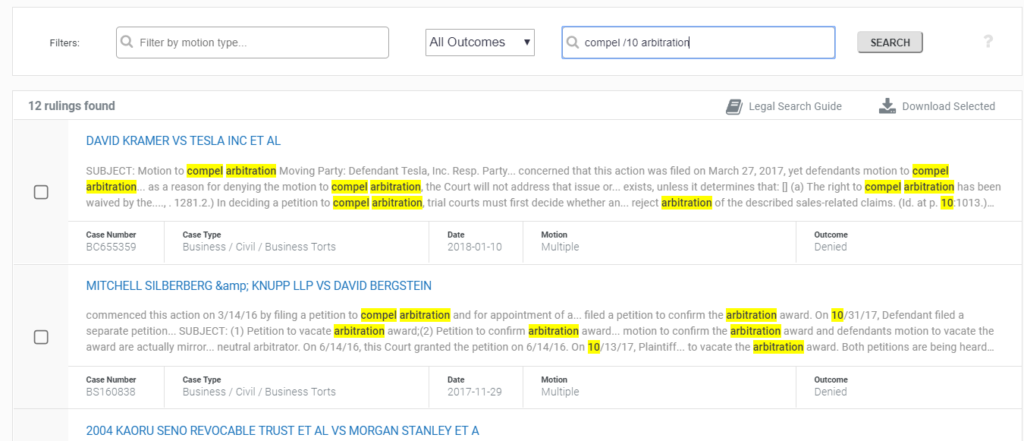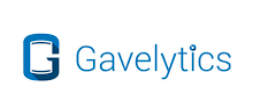
Welcome to another legal tech roundup where Artificial Lawyer brings you a selection of news and developments from recent days. First up, Gavelytics.
Gavelytics Expands LA Coverage, Offers New Arbitrator Behaviour Analysis Capability
Los Angeles-based legal AI + litigation research company, Gavelytics, is launching an enhanced judicial analytics platform that includes a rulings database and arbitrator behaviour capability.
The rulings database includes thousands of LA trial court orders dating back to 2000. Users can easily identify relevant documents by judge, subject matter and type of motion.

As part of the same rollout, LA-based (pictured above) Gavelytics has introduced an arbitrator archive that provides greater understanding into the past behavior of more than 30 arbitrators who are former Superior Court judges. The archive is a tool that helps attorneys ask the right questions about their assigned arbitrator.
Artificial Lawyer found the idea of studying arbitrator behaviour especially interesting and asked Gavelytics if founder Rick Merrill, Gavelytics CEO, could add some more detail. Please see the responses below:
How is the info on arbitrators collected? Are arbitration decisions not usually kept secret? Where does the info come from?

Gavelytics provides actionable insights on arbitrators who are retired Superior Court judges, which most are. We provide analytics focusing on their time on the bench, not (as of today) about their time as arbitrators. The arbitrator archive helps litigators make their arbitration panel selections with far more confidence about what kind of arbitrator they are selecting. One of our primary focuses, moving forward, will be to continue to expand the scope of and insights available from our arbitrator archive.
What types of questions/areas can the arbitration tool cover?
Most analytics features we currently provide on sitting judges are also provided for arbitrators who previously served as judges. So, for example, Gavelytics can tell you how arbitrators used to rule on over 100 types of motions (broken down by filing party and case type), how often they received CCP 170.6 peremptory challenge filings (and from which party in which kind of case), and how the arbitrator used to rule on bench trials. If the arbitrator retired within the last 2 years, we also have in a searchable database, hundreds of actual trial court rulings written by the judge before retiring and becoming an arbitrator.
By way of example – if a judge showed a years-long, strong preference for granting discovery motions while on the bench, it’s a very reasonable inference that the same pattern will hold as an arbitrator. Similarly, if plaintiffs tended to win far more often than defendants at bench trial, this suggests the arbitrator may lean towards plaintiffs.
Therefore, instead of simply guessing at a list of names for an arbitration panel, you can now measure each one with Gavelytics and get inside knowledge regarding how they are likely to rule in the arbitration.
—
Canadian Legal AI Co. Diligen Bags Chicago Law Firm Levenfeld Pearlstein
Toronto-based legal AI company, Diligen, has been selected by Levenfeld Pearlstein, a mid-size law firm based in Chicago, to provide NLP-driven doc review capabilities.
The AI company said that using Diligen, Levenfeld Pearlstein plans to develop contract summaries that allow their clients to quickly find answers to common questions, speeding up resolution times and improving client service.

Bartzen said in a statement: ‘In the span of just a few hours, I was able to train the Diligen platform to recognize a number of new clauses unique to our practice area, across a variety of documents. This will pay dividends in perpetuity as the system can now surface those clauses and provisions in all of our contracts moving forward.’
‘It can essentially help front-load the review into the initial intake, create a comprehensive report of the key provisions, which can then be reviewed when providing the client advice,’ he added.
While Diligen comes already trained to identify the most common provisions and clauses lawyers are looking for in a contract, it is not uncommon for law firms and legal teams to look for clauses that are unique to their own business. Using machine learning, Diligen can be trained to identify these unique clauses, and they can be added to the library so the system can identify them automatically in the future.
—
Litera Microsystems Launches Clause Companion
US-based document and knowledge management conglomerate, Litera Microsystems, has released a new system, Clause Companion, which helps lawyers to store information at a ‘preferred clauses’ level from within Microsoft Word.
This clause-level capability should boost knowledge management efficiency by offering the ability to easily store, retrieve, and insert correctly-formatted clauses; more easily access a firm’s clause library to encourage the use of approved content without the need to switch to another system; and share selected clauses between users or across departments.

Avaneesh Marwaha, CEO of Litera Microsystems, said of the launch: ‘Clause Companion shows our commitment to innovation as a combined organisation. We will continue to deliver solutions that improve the document drafting process, which fit within the workflow of lawyers, and which provide further evidence of the benefit of vendor consolidation within the drafting technology space.’